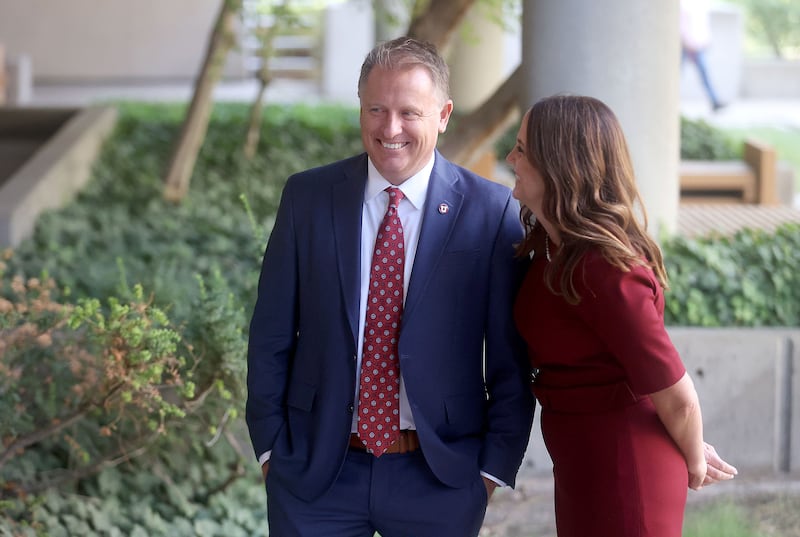The new guy bounds down the stairs of the John R. Park Building to greet a group on a University of Utah campus tour.
He asks if there are any first-year students among them, explaining he’s been on the job a just short time himself.
“I’m Taylor Randall,” he says, initially dispensing the formality of his title as the 17th president of Utah’s public flagship institution.
“I’m kinda new here, too.”
Randall may be new to the position of president, but the University of Utah has been part of his life since childhood.
He, his father and grandfather were University of Utah professors. Prior to his selection as university president on Aug. 5 by the Utah Board of Higher Education, Randall was dean of the David Eccles School of Business, a position he held since 2009. His grandfather was also a business school dean.
Randall earned his undergraduate degree from the University of Utah in accounting and then studied at the Wharton School of Business at the University of Pennsylvania, earning master’s and doctoral degrees.
He didn’t intend to return to Utah after living and going to school in the East. He had accepted a job at the University of Chicago but returned to the Beehive State so he and his wife could help care for her ailing parents.
“I didn’t think I’d ever come back to the University of Utah, but once I was back, once I was back to campus, the passion was rekindled. I remembered why I love this place and why it was so special to me,” he said.
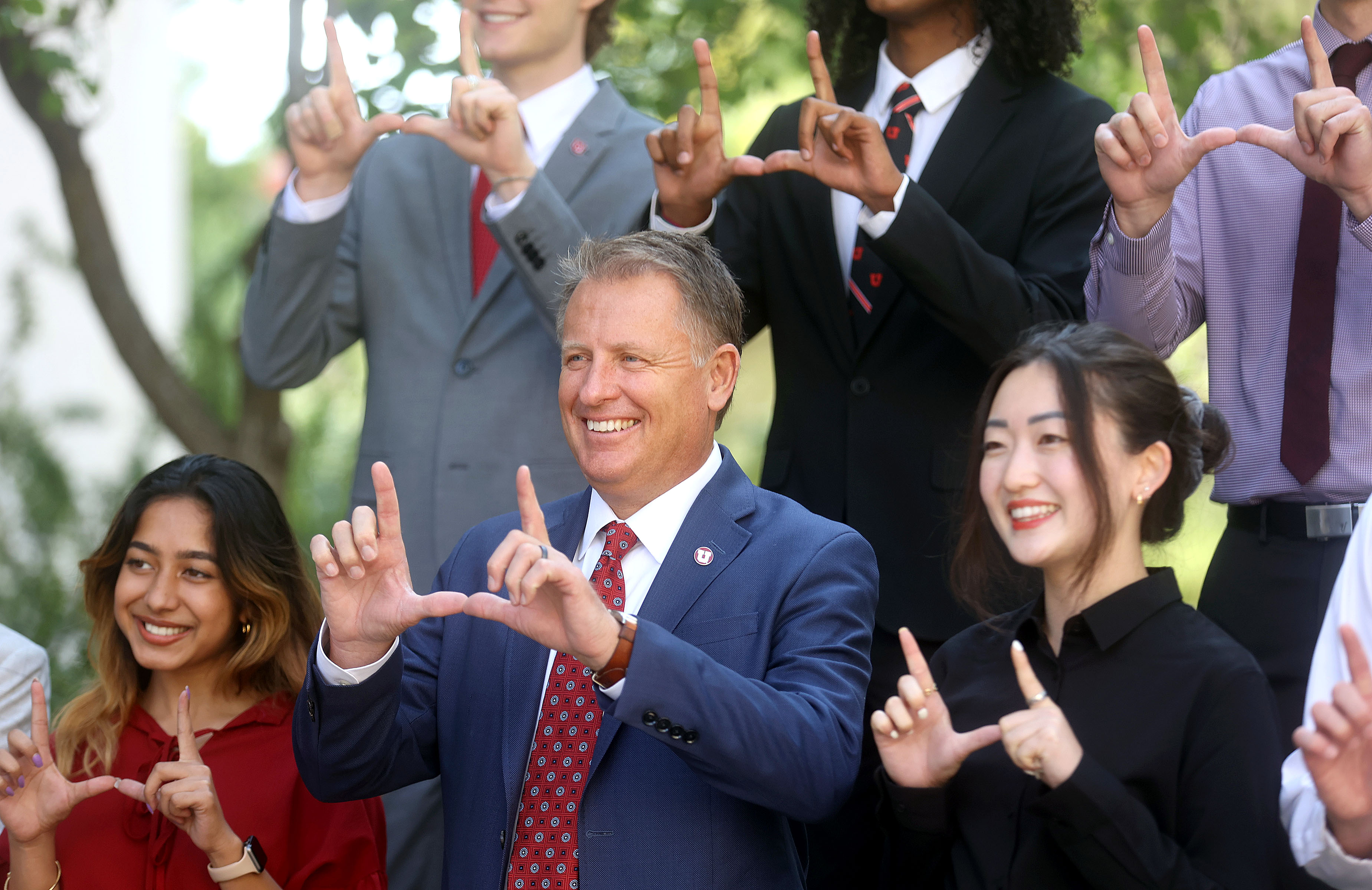
He credits the university for “transforming” him, helping him hone many of the skills he has relied upon his entire career — effective communication and analysis.
Brooke Hopkins, a highly regarded, Harvard-educated English professor, gave him an F on the first essay Randall wrote for his class. Hopkins also wrote on the essay, “Come see me.”
“I rewrote it four times. I got a B+. You know what? He taught me what I didn’t know. He taught me I could improve. He taught me analytical skills,” he said.
Randall, who can command a lecture hall with ease and is equally adroit in small groups, said as a college student, he was afraid to present in front of people. He was advised to take an extemporaneous acting class.
“I was asked to be a talking elevator door and I was supposed to have conversations with people that walked in the elevator. That class changed the way I think about presenting to you here today,” he said, during his on-campus town hall conducted as part of the interview process for the presidency in early August.
As he reflects on his nearly lifelong connection to the University of Utah, Randall said he is “passionate about this place. My family says I’m irrationally passionate. I love that this place has transformed me since I was a student. It has transformed my career. It has really made me imagine a different world for me, for my family, for students.”
Ongoing pandemic
As the 17th president of the university, Randall transitions into the presidency at a time of great uncertainty. Fall semester has begun and cases of COVID-19 are on the rise as a more virulent variant of the virus spreads across the country.
The university recently announced it will implement a vaccination requirement for students, along with University Health employees, health care providers and health academics staff.
The university’s website urges the university community to “follow CDC guidelines regarding face masks,” which now call for everyone to wear them indoors. There is no requirement to wear masks because state law currently prohibits it. The university is relying on students, faculty and staff to exercise care for one another by voluntarily complying with recommendations to wear face coverings.
“It has to be an incredible exercise of showing empathy for others,” said Randall.
“We can certainly argue the different observations about masks and science one way or the other. But at the end of the day, there are people here that we really care about, that have to be here to provide education and if they’re nervous, we owe it to them to put on a mask and make them feel comfortable,” he said.
While dean of the business school, Randall has served as Utah’s economic lead on the Unified Command for the COVID-19 recovery, an experience that will help guide his decision-making.
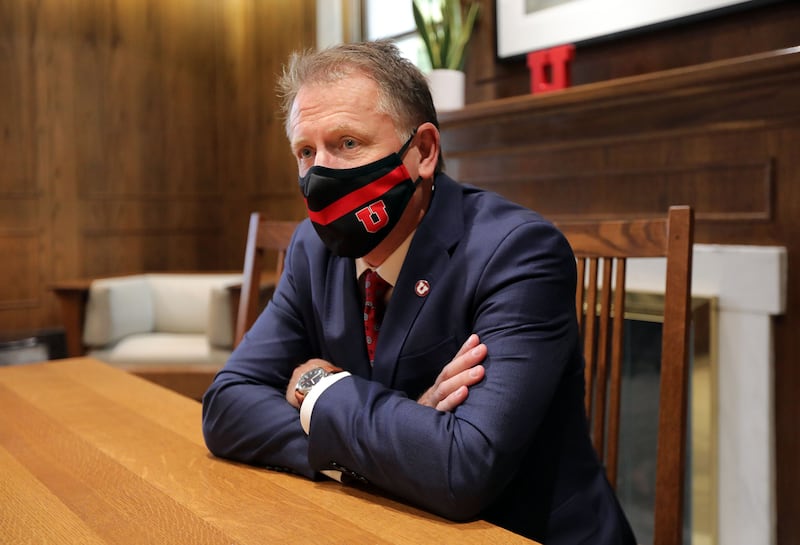
Public safety
Randall also assumes the presidency as the university’s public safety efforts continue to evolve in the aftermath of the on-campus slaying of student-athlete Lauren McCluskey in October 2018.
McCluskey was fatally shot outside of her dorm by a man she had dated. McCluskey’s parents sued the university and in November 2020 reached a $13.5 million settlement of their two lawsuits. As part of the settlement, the university acknowledged it mishandled McCluskey’s multiple reports to police.
The university is working to implement reforms such as officers wearing body cameras and an initiative to hire more female officers.
The university’s first chief safety officer and new police chief hired by the university to succeed former Chief Dale Brophy, who oversaw public safety on the campus from 2015 until his retirement in 2019, have both left their positions. Former Utah Commissioner of Public Safety Keith Squires is serving as the university’s interim chief safety officer.
Former Police Chief Rodney Chatman recently filed a lawsuit against the university seeking $2.5 million in damages. The lawsuit alleges the university blocked his investigation into the handling of McCluskey’s case and attempted to “scapegoat Chatman in an effort to avoid scrutiny and preserve its public image.”
Randall said McCluskey’s death “still resonates deep on this campus.” As president, he and his leadership team are working toward “a set of very clear, articulated goals that will continue to make process progress” in public safety.
The university’s data must be transparent “so people know what’s happening,” Randall said.
“We can’t operate in a bubble and just put policies in place. We’ve begun to organize community groups that will regularly give us feedback. Hopefully, from those two things, a culture will emerge, a culture where people begin to feel safe,” he said.
About Taylor Randall
Randall was born in California while his father earned his doctorate at the University of California, Berkeley. He grew up in the Holladay area and is a graduate of Olympus High School.
He and his wife, Janet, met in high school and married after he served a mission for The Church of Jesus Christ of Latter-day Saints in Barcelona, Spain. The couple has four children.
He is the first University of Utah president in 50 years who is a graduate of the university. The last was President Alfred C. Emery, who served from 1971 to 1973.
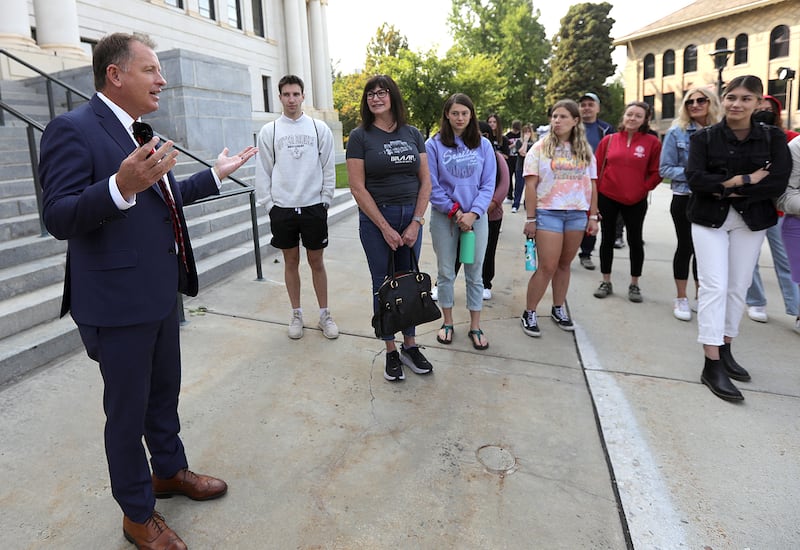
Inclusivity and diversity on campus
Both during his on-campus town hall and his remarks immediately after being named president, Randall vowed that the university’s path forward would be an “inclusive mission.”
“Regardless of sex, socioeconomic status, sexual orientation, religion, we are here to bring everyone in. This is a place where society gets transformed. It’s where we learn to get along with each other. It’s where we have to model that behavior. But we also have to give that as a gift to our students because that will be one of the major challenges of our lifetime,” Randall said during the town hall.
Utah’s demographics are changing in profound ways and ”I hope that I am seen as leading that inclusivity,” he said during a recent interview.
During his tenure as business school dean, the school formed the First Ascent Scholars Program, which serves first-generation students from underrepresented populations with significant financial needs.
“This is a place where society gets transformed. It’s where we learn to get along with each other. It’s where we have to model that behavior. But we also have to give that as a gift to our students because that will be one of the major challenges of our lifetime.” University of Utah President Taylor Randall
The school’s website also reflects the fruit of 10 years of “trying to be thoughtful around this issue ... particularly gender diversity in our leadership team. We’re very excited that amongst state schools ... we had one the highest percentages of tenured and tenure-track women in our faculty.
“We did a reasonably good job in terms of diversification of the student body there’s some areas there that we feel like we were falling short and still need to work on. But that’s part of this journey, right? You constantly have to self-evaluate, take feedback and understand where people aren’t feeling a sense of belonging and try to rearrange,” Randall said.
Loves fundraising
During the town hall, Randall revealed that he “loves fundraising,” which he admitted might sound strange to university audience.
“It’s a blast,” he said.
It starts by engaging with alumni, inviting them on campus for faculty lectures and other events. After a while, he asks a question like, “What was your best moment at the University of Utah?”
They share their stories and when the time is right, he asks if they would like to create three more of those moments. But it’s not all about money, it’s also about establishing mentoring and employment opportunities for students.
“The money will come as you take a long view of people and get them engaged in this university, but you’ve got to be a little patient. You’ve got to kind of both use the science and the art to make it happen,” he said.
Related milestones include increasing scholarship funding for students from $800,000 to more than $15 million and the creation of four highly regarded centers and institutes that serve students and broader communities: The Kem C. Gardner Policy Institute, Sorenson Impact Center, the Marriner S. Eccles Institute for Economics and Quantitative Analysis, and the Goff Strategic Leadership Center.
Seven of the Eccles School’s programs are ranked in the top 25 and its entrepreneurship program is ranked among the top 10 nationally. The program is provided in partnership between the Department of Entrepreneurship & Strategy and the Lassonde Entrepreneur Institute.
Lassonde Studios, a one-of-a-kind innovation center for students on campus to live, create and launch together, continues to attract international attention.
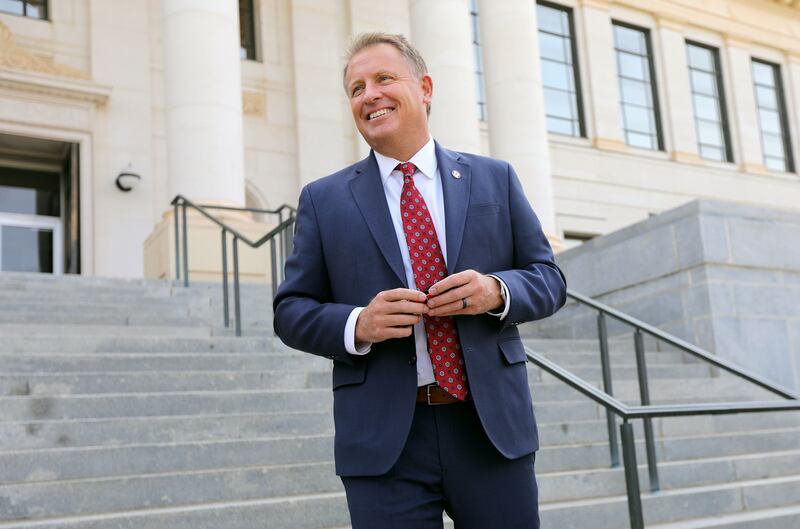
Personal touch
Before Randall became a successful education leader, he earned accolades as a teacher.
He has been honored as the best teacher in the business school’s Master of Business Administration program, Executive MBA program and undergraduate programs as well as a Brady Superior Teaching Award winner, which is a career achievement award.
Under Randall’s guidance as faculty director, the University Venture Fund became the largest student-run venture fund in the country.
Outside of the classroom, many students have gotten to know Randall on hikes, golf outings or bike rides he arranged.
Randall said he set aside time to make those connections, in part, because he loves his job and his belief as a teacher that “this is what you do when you’re an educator and it’s what I like to do.”
Next steps
One of Randall’s first acts as president was to assemble a transition team to map out goals and initiatives for the early part of his presidency. He jokes that he had what was perhaps the shortest transition in university history, named president on a Thursday and occupying the corner office of the Park Building the next day.
Randall plans to start his tenure by listening and asking questions. He has asked the transition team to design a process so he can meet with every school and college over the next three months to learn more about their plans, priorities and challenges.
“I’m specifically interested in drawing out three areas of focus: Research creativity and innovation, student experiences and our One U initiative, which in addition to uniting our campus and serving all of Utah, invites all people to participate in the bounties of higher education,” he said in a statement.
He also asked the team to complement the university’s existing strategic plan, Strategy 2025, developed in 2019 during former President Ruth Watkins’ administration.
Randall’s road map has yet to be revealed, but his earlier statements suggest he has big plans for his alma mater.
“What I would like to challenge you all with is, let’s be bold. Let’s do something that will knock our socks off and everybody else’s socks off. And let’s dare to be a premier institution of higher learning,” Randall said during his on-campus town hall.
He quoted Nobel Prize winner Ellen Johnson Sirleaf, who is an economist and the first woman to be elected head of state of an African country, who said, “If your dreams don’t scare you, they are not big enough.”
The University of Utah, now in its 10th year in the Pac-12 conference and a member of the prestigious Association of American Universities institutions since 2019, is at a critical juncture in its history.
“I think it’s our moment, it’s our time. It’s an inflection point, when we can actually do something that moves our stature up in the world of higher education. And I would love to do that with you,” Randall told the university community.

